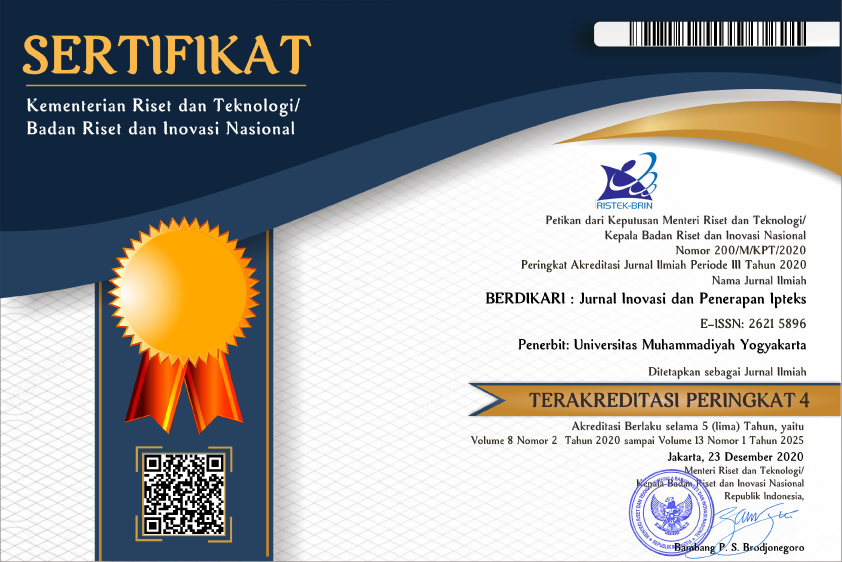Pentingnya Pengetahuan Pemeriksaan Payudara Sendiri sebagai Deteksi Dini Kanker Payudara
DOI:
https://doi.org/10.18196/berdikari.v10i1.13594Keywords:
Early detection, breast cancer, BSE, reproductive ageAbstract
Breast cancer is included in the five types of cancer that result in death. The reason is the delay in early detection so that survivors of this type of cancer are generally detected at an advanced stage. The community service entitled "PKM Knowledge and Early Detection of Breast Cancer in Women of Reproductive Age" aims to provide knowledge about the importance of breast self-examination (BSE) as an effort to detect breast cancer early. The method used is through online seminars via Zoom Meetings to 20 employees and their families at the Obstetrics and Gynecology Clinic, Muhammadiyah Asri Medical Center Hospital, Yogyakarta. The material provided was in the form of knowledge about women's health, breast cancer and its treatment, and training on BSE, which was preceded by a pretest to measure participants' knowledge before the seminar and a posttest at the end of the activity after receiving the seminar. The results of the pretest and posttest were analyzed using the Wilcoxon Signed-Rank test method. The results of the pretest showed that 17 participants (85.0%) had sufficient knowledge about BSE and 2 participants (10.0%) had less knowledge. The posttest results showed that all participants (100.0%) had knowledge in the good category about BSE. The test results showed a significance value of 0.001 (p < 0.05), which means that there was a significant increase in participants' knowledge about BSE as early detection of breast cancer before and after the seminar.
References
Abera, H., Mengistu, D., & Bedaso, A. (2017). Effectiveness of planned teaching intervention on knowledge and practice of breast self-examination among first year midwifery students. PLoS ONE, 12(9). https://doi.org/10.1371/journal.pone.0184636
Dahlan, M. S. (2021). STATISTIK UNTUK KEDOKTERAN DAN KESEHATAN: Deskriptif, Bivariat, dan Multivariat (6th ed.). Jakarta: MSD books.
Desanti, O. I., Sunarsih, I., & Supriyati. (2010). Persepsi Wanita Berisiko Kanker Payudara Tentang Pemeriksaan Payudara Sendiri Di Kota Semarang, Jawa Tengah. Berita Kedokteran Masyarakat, 26(3), 152–161.
Dinkes Kota Yogyakarta. (2020). Profil Dinas Kesehatan Kota Yogyakarta Tahun 2020 (Data Tahun 2019). Profil Dinas Kesehatan Kota Yogyakarta tahun 2019.
Kalliguddi, S., Sharma, S., & Gore, C. A. (2017). Knowledge, attitude, and practice of breast self-examination amongst female IT professionals in Silicon Valley of India. Journal of Family Medicine and Primary Care, 6(2), 169–170. https://doi.org/10.4103/jfmpc.jfmpc
KEMENKES RI. (2021). Profil Kesehatan Indonesia 2020. Kementrian Kesehatan Republik Indonesia. Retrieved from https://pusdatin.kemkes.go.id/resources/download/pusdatin/profil-kesehatan-indonesia/Profil-Kesehatan-Indonesia-Tahun-2020.pdf
Kementerian Kesehatan RI. (2019a). Beban Kanker di Indonesia. Pusat Data Dan Informasi Kesehatan Kementerian Kesehatan RI, pp. 1–16.
Kementerian Kesehatan RI. PERATURAN MENTERI KESEHATAN REPUBLIK INDONESIA NOMOR 34 TAHUN 2015 TENTANG PENANGGULANGAN KANKER PAYUDARA DAN KANKER LEHER RAHIM, Kementerian Kesehataan RI (2019). https://doi.org/10.1145/3132847.3132886
Mekonnen, B. D. (2020). Breast self-examination practice and associated factors among female healthcare workers in Ethiopia: A systematic review and meta-analysis. PLoS ONE, 15(11 November), 1–18. https://doi.org/10.1371/journal.pone.0241961
Nagai, H., & Kim, Y. H. (2017). Cancer prevention from the perspective of global cancer burden patterns. Journal of Thoracic Disease, 9(3), 448–451. https://doi.org/10.21037/jtd.2017.02.75
Nelson, H. D., Fu, R., Cantor, A., Pappas, M., Daeges, M., & Humphrey, L. (2016). Effectiveness of breast cancer screening: Systematic review and meta-analysis to update the 2009 U.S. Preventive services task force recommendation. Annals of Internal Medicine, 164(4), 244–255. https://doi.org/10.7326/M15-0969
Sarker, R., Islam, M. S., Moonajilin, M. S., Rahman, M., Gesesew, H. A., & Ward, P. R. (2021). Effectiveness of educational intervention on breast cancer knowledge and breast self-examination among female university students in Bangladesh: a pre-post quasi experimental one group study. MedRxiv, 1–21.
Sudjana. (2002). Metode statistika. Bandung: Tarsito.
Sung, H., Ferlay, J., Siegel, R. L., Laversanne, M., Soerjomataram, I., Jemal, A., & Bray, F. (2021). Global Cancer Statistics 2020: GLOBOCAN Estimates of Incidence and Mortality Worldwide for 36 Cancers in 185 Countries. CA: A Cancer Journal for Clinicians, 71(3), 209–249. https://doi.org/10.3322/caac.21660
Tuna, A., Avdal, E. U., Yucel, S. C., Dal, N. A., Dicle, A., Ozkan, A., … Degirmenci, M. (2014). Effectiveness of online education in teaching breast self-examination. Asian Pacific Journal of Cancer Prevention, 15(7), 3227–3231. https://doi.org/10.7314/APJCP.2014.15.7.3227
Yogyakarta, D. K. (2019). AKSELERASI PENCEGAHAN DAN PENGENDALIAN KANKER PAYUDARA DAN LEHER RAHIM DINAS KESEHATAN DAERAH ISTIMEWA YOGYAKARTA. Dinas Kesehatan Daerah Istimewa Yogyakarta.
Downloads
Published
Issue
Section
License
Copyright
Authors retain copyright and grant BERDIKARI Jurnal Inovasi dan Penerapan IPTEK the right of first publication with the work simultaneously licensed under an Attribution 4.0 International (CC BY 4.0) that allows others to remix, adapt and build upon the work with an acknowledgment of the work's authorship and of the initial publication in BERDIKARI Jurnal Inovasi dan Penerapan IPTEK.
Authors are permitted to copy and redistribute the journal's published version of the work (e.g., post it to an institutional repository or publish it in a book), with an acknowledgment of its initial publication in BERDIKARI Jurnal Inovasi dan Penerapan IPTEK
License
Articles published in the BERDIKARI Jurnal Inovasi dan Penerapan IPTEK) are licensed under an Attribution 4.0 International (CC BY 4.0) license. You are free to:
- Share — copy and redistribute the material in any medium or format.
- Adapt — remix, transform, and build upon the material for any purpose, even commercially.
This license is acceptable for Free Cultural Works. The licensor cannot revoke these freedoms as long as you follow the license terms. Under the following terms:
- Attribution — You must give appropriate credit, provide a link to the license, and indicate if changes were made. You may do so in any reasonable manner, but not in any way that suggests the licensor endorses you or your use.
- No additional restrictions — You may not apply legal terms or technological measures that legally restrict others from doing anything the license permits.




